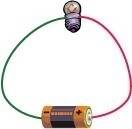GetStudySolution
Getstudysolution is an online educational platform that allows students to access quality educational services and study materials at no cost.
NCERT Solutions for class 6 Science chapter 12 – Electricity and Circuits
Back Exercise
Page No 123:
Question 1:
Fill in the blanks:
(a) A device that is used to break an electric circuit is called a ______ __.
(b) An electric cell has ______ __ terminals.
Answer:
(a) A device that is used to break an electric circuit is called a __switch__.
Switch:
A switch is an electric device that is used to break a circuit. When the switch is in ‘OFF’ position, then the circuit is not complete. Then, the circuit is called an open circuit. An electric current cannot flow through this circuit.
(b) An electric cell has __two__ terminals.
Two terminals:
An electric cell has two terminals, a negative terminal and a positive terminal (as shown in the given figure).

Question 2:
Mark ‘True’ or ‘False’ for the following statements:
(a) Electric current can flow through metals.
(b) Instead of metal wires, a jute string can be used to make a circuit.
(c) Electric current can pass through a sheet of thermocol.
Answer:
(a) True
Metals are good conductors of electricity. They allow an electric current to flow through them easily. Hence, an electric current can flow through metals.
(b) False
Jute string is a bad conductor of electricity. If jute string is used to make an electric circuit, then the current will not flow through it. Hence, strings made of jute cannot be used to make circuits.
(c) False
Thermocol is a bad conductor of electricity. Hence, electric current cannot pass through it.
Question 3:
Explain why the bulb would not glow in the arrangement shown in Fig.12.13.

Answer:
An electric current cannot pass through objects such as plastic scales, tester holders, etc., because these objects are bad conductors of electricity.
From the given figure, it can be observed that one terminal of the bulb is connected to a tester holder. A current will not flow through the circuit. Hence, the bulb would not glow.
Page No 124:
Question 4:
Complete the drawing shown in Fig 12.14 to indicate where the free ends of the two wires should be joined to make the bulb glow.

Answer:
The given circuit is not complete. To complete the circuit, the positive terminal of the cell should be connected to one end of the switch, and the other terminal of the bulb should be connected to the other end of the switch. The closed circuit is shown in the following figure:

Question 5:
What is the purpose of using an electric switch? Name some electrical gadgets that have switches built into them.
Answer:
A switch is an electric device that is used to complete or break an electric circuit. If the switch is ‘ON’, then a current can flow through the circuit. However, if the switch is ‘OFF’, then the current cannot flow through the circuit.
Electrical appliances such as table fans, electric lamps, washing machines, juicers and mixers, TV, radio, etc. have switches built into them.
Question 6:
Would the bulb glow after completing the circuit shown in Fig. 12.14, if we use an eraser instead of a safety pin?
.jpg)
Answer:
Erasers are bad conductors of electricity. They do not conduct electricity. The circuit becomes an open circuit. Hence, the bulb will not glow if a safety pin is replaced with an eraser.

Question 7:
Would the bulb glow in the circuit shown in Fig. 12.15?

Answer:
The bulb will not glow. This is because the two terminals of the cell are connected to the single terminal of the bulb. This is equivalent to the bulb not being connected in the circuit at all. The two terminals of the battery should be connected to the two terminals of the cell.
Question 8:
Using the ‘conduction tester’ on an object, it was found that the bulb begins to glow. Is the object a conductor or an insulator? Explain.
Answer:
When the two free ends of a conductor tester are touched with an object, then the bulb of the tester would glow if the object conducts electricity. However, the bulb would not glow if the object does not conduct electricity. Since the bulb glows when the tester is touched with the object, the object must conduct electricity. Hence, the object is a conductor.
Question 9:
Why should an electrician use rubber gloves while repairing an electric switch at your home? Explain.
Answer:
An electric switch is an electrical appliance. It conducts electricity through its internal parts. When its internal parts are touched with naked hands, then it may cause an electric shock. Therefore, it should be touched with rubber gloves in hand because rubber cannot conduct electricity. Hence, electricians wear rubber gloves while repairing a switch or any other electrical appliance.
Question 10:
Handles of tools such as screwdrivers and pliers used by electricians for repair work usually have plastic or rubber cover on them. Can you explain why?
Answer:
Rubber is a bad conductor of electricity. It does not allow current to flow through it. Hence, handles of tools such as screwdrivers, pliers, etc. which are used by electricians for repair work usually have plastic or rubber cover on them. This protects them from electric shocks.